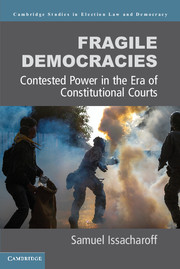Book contents
- Frontmatter
- Contents
- Preface
- Introduction: The Burden of Modern Democracy
- PART I MILITANT DEMOCRACY
- PART II COMPETITIVE DEMOCRACY
- 6 Giving Up Power
- 7 The Promise of Constitutional Democracy
- 8 Transition in South Africa
- 9 The Era of Constitutional Courts
- 10 The Constitutional Bargain
- 11 Can Law Protect Democracy?
- 12 Constitutionalism in the Time of Fragile Democracies
- Epilogue: Democratic Objectives
- Index
6 - Giving Up Power
from PART II - COMPETITIVE DEMOCRACY
Published online by Cambridge University Press: 05 July 2015
- Frontmatter
- Contents
- Preface
- Introduction: The Burden of Modern Democracy
- PART I MILITANT DEMOCRACY
- PART II COMPETITIVE DEMOCRACY
- 6 Giving Up Power
- 7 The Promise of Constitutional Democracy
- 8 Transition in South Africa
- 9 The Era of Constitutional Courts
- 10 The Constitutional Bargain
- 11 Can Law Protect Democracy?
- 12 Constitutionalism in the Time of Fragile Democracies
- Epilogue: Democratic Objectives
- Index
Summary
When teaching a course on the constitutional law of democracy, it is my custom to open the first day of class with what I describe as a modern-day parable. As presented to the students, the events concern a precipitous and heated confrontation some twenty years ago that I suggest may have escaped their notice. The conflict pitted the head of a large and powerful state against the leader of a small and poorly armed state. As the events unfolded, the tension between the two leaders mounted dramatically. The partisans of the two camps became increasingly divided and braced for what seemed the inevitable showdown. After months of skirmishing, the denouement arrived and the leader of the small state proved victorious. Perhaps most remarkably, the leader of the state of crushingly superior military force turned over his entire arsenal to the newly victorious head of the small state and quietly left office with little concern for incarceration or assassination, contented with nothing more than the equivalent of the palace guards to usher him away.
Now the events in question are, of course, a cartoon rendition of the 1992 U.S. presidential election between the incumbent President George Bush and the governor of Arkansas, Bill Clinton. The shaggy-dog quality of the telling aims to convey just how exceptional it has been, in the course of human history, for power to pass peacefully across a heated partisan divide, particularly when the usually decisive weight of military force rests exclusively in the hands of the displaced incumbent power. The question for the students then becomes to discern the necessary conditions for power to pass in this fashion.
In turn, the chapters that follow examine just this question from the perspective of new democracies. Our modern conception of democracy assumes what Abraham Lincoln termed a “government of the people, by the people, for the people,” in which each election presents a meaningful alternative between rival sets of candidates, and in which the electors make the choice of who shall govern.
Information
- Type
- Chapter
- Information
- Fragile DemocraciesContested Power in the Era of Constitutional Courts, pp. 127 - 136Publisher: Cambridge University PressPrint publication year: 2015
